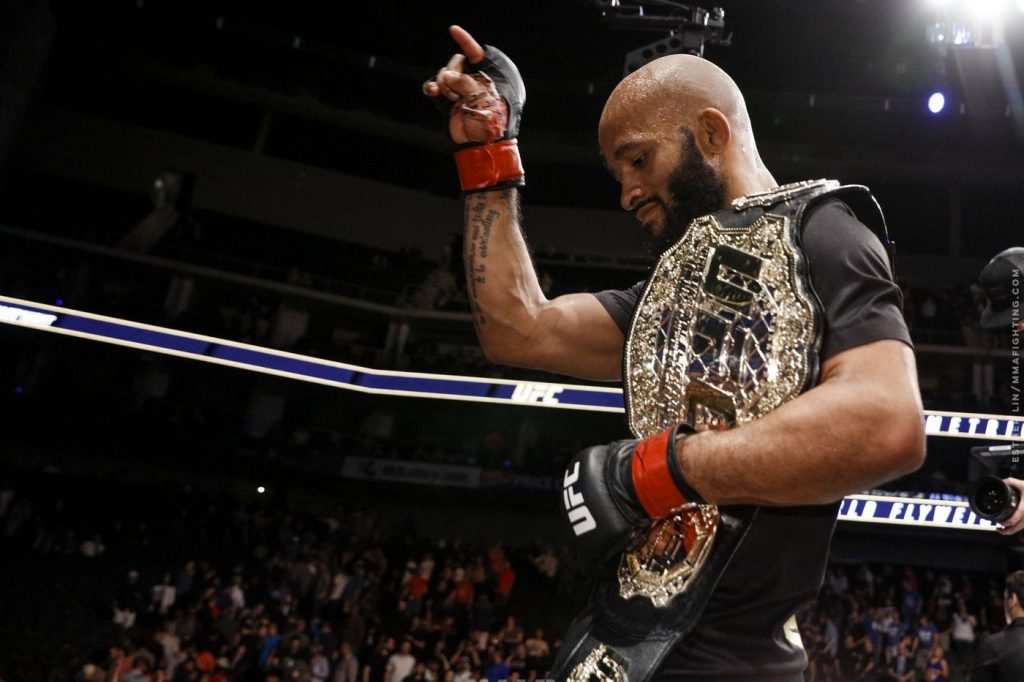
Early on, when the flyweight division was first introduced to the UFC in 2012, it felt like the ultimate gesture to Joseph Benavidez — the promotion’s most glaringly miscast bantamweight. The UFC created a miniature four-man tournament that kicked off at an UFC on FX card down in Australia, pairing Benavidez — who at that point had beaten everybody not named Dominick Cruz— against Yasuhiro Urushitani. Who was Yasuhiro Urushitani? He was like a rare Japanese import at the music shop; something that guys like Jordan Breen might talk about in a way that made you want to spend some money. He was the new cool. The whole division was.
People wanted to know about them.
The other half of the original flyweight bracket featured Demetrious Johnson, another very good 125-pounder who had been successfully masquerading as a bantam, and Ian McCall — the great “Uncle Creepy” who’d come from some far-off scene known as the “Tachi Palace.” McCall had been regularly ranked at the top of the world’s 125-pound fighters on the expanded lists, so his reputation preceded him to the UFC. He was the hipster choice to wreck some fools.
I can remember the burning question back then being, what’s going to happen with these super-strength small fry when they get loosed in a cage? It was all very blurry. Literally. One of my first descriptions was that they came out like dueling banjos. Later I remember writing about McCall versus Johnson as two motorcyclists in a Globe of Death, just zooming around each other in a most hazardous way possible.
In other words, it was the kind of novelty that wasn’t a novelty at all, but a different kind of class. The frenetic energy of a flyweight fight was enough to send play-by-play bloggers into conniptions, and to defy the public eye in real time. The original joke was that you had to watch a flyweight fight in slow motion to actually compute what it was you were seeing. That automatically made the division an acquired taste.
And as it turned out, Benavidez wasn’t the man. “Mighty Mouse” was. He remained that way right up until the moment he wasn’t, which just so happens to coincide with the division getting 86’d.
Six-and-a-half years after its creation, we are on the cusp of seeing the 125-pound division disbanded by the UFC. Why? The problem seems to be that fans didn’t care. Or, they didn’t care enough. Some people did, but it was always an argument as to why the flies weren’t translating. Whenever Demetrious Johnson’s greatness was brought up, you could expect a vocal minority to defend him — somewhat righteously — against conservatives of the bigger body, those who never could get behind jockey-sized athlete. When flyweight fights evolved from 15-minute scrambles, they became like everything else. Judged in context of all fights. Yawned at in ways that people would yawn at lethargic middleweights. Lost in the shuffle of dozen bouts on a fight card.
It’s a little sad to see the division fade away. Though there weren’t enough fighters to keep the cupboards at 125 overflowing, many of the fights were memorable affairs. The accusation that flies didn’t have power was largely a fable. Benavidez knocked out Urushitani in the semis, and off we went. The idea that they didn’t have personality is perhaps a little harder to defend. But the fights were unique theater for people who dug on action. Pure action. Who can forget Louis Gaudinotversus John Lineker? Or the way in which Johnson submitted Ray Borg?
The first Mighty Mouse-McCall fight remains a classic, not just because of the confusion of it ending in a majority draw (after a miscalculation one of the scorecards); but because McCall had it. He was wailing away and shouting out things in the third round, the kind of ridiculously unstable visual that could have come to define the division. For just a minute, McCall had his hand on the sliding doors of history.
What would have happened if he had won out in Sydney? If he had knocked off Johnson, and instead of entering the Mighty Mouse era we entered the Uncle Creepy era? Would the twisted mustachio have compelled us in ways that Johnson didn’t? Would the UFC have branded the old school bare-knuckle pose? What if it were Benavidez? What if there had been multiple champions in the last several years, instead of one dynamic tyrant? Would that have been enough to keep the interest? Was it Johnson that was polarizing, or the diminutive frames? What if Sergio Pettis really could fly in on a magic carpet?
The truth is we’ll never know. The UFC has too many divisions, and — in 2018 — has shifting priorities. It no longer covets the very best athletes in every weight class. It covets maximum marketability. If it wants to truly create a 165-pound division in the near future, something has got to go. It appears to be the flies, the land of all the Jussier Formiga’s and Ben Nguyen’s.
The writing’s on the wall, and has been for a while.
Current champion Henry Cejudo wants to challenge T.J. Dillashaw at 135 pounds. Lineker already made the jump, and is talking about a fight with Cruz. The original cast is already dispersed. Johnson had his contract shipped off to Asia. Urushitani and McCall are done. Benavidez just had his fight cancelled with Ray Borg, through no fault of his own. Benavidez can go back to bantamweight, where he once flourished. Cruz, who in many ways was the originator of the flyweight division because he’d killed off so many contenders at bantamweight, is no longer at the top over there.
Things have changed. The UFC is moving on. Six years after debuting in Australia, the flies are no longer buzzing.





More News
Quiñonero fights Verdadero in Resbak 2
Resbak 2 at Malungon, Sarangani Province on July 12
Garde stops Baliente in 1st round in “Resbak”